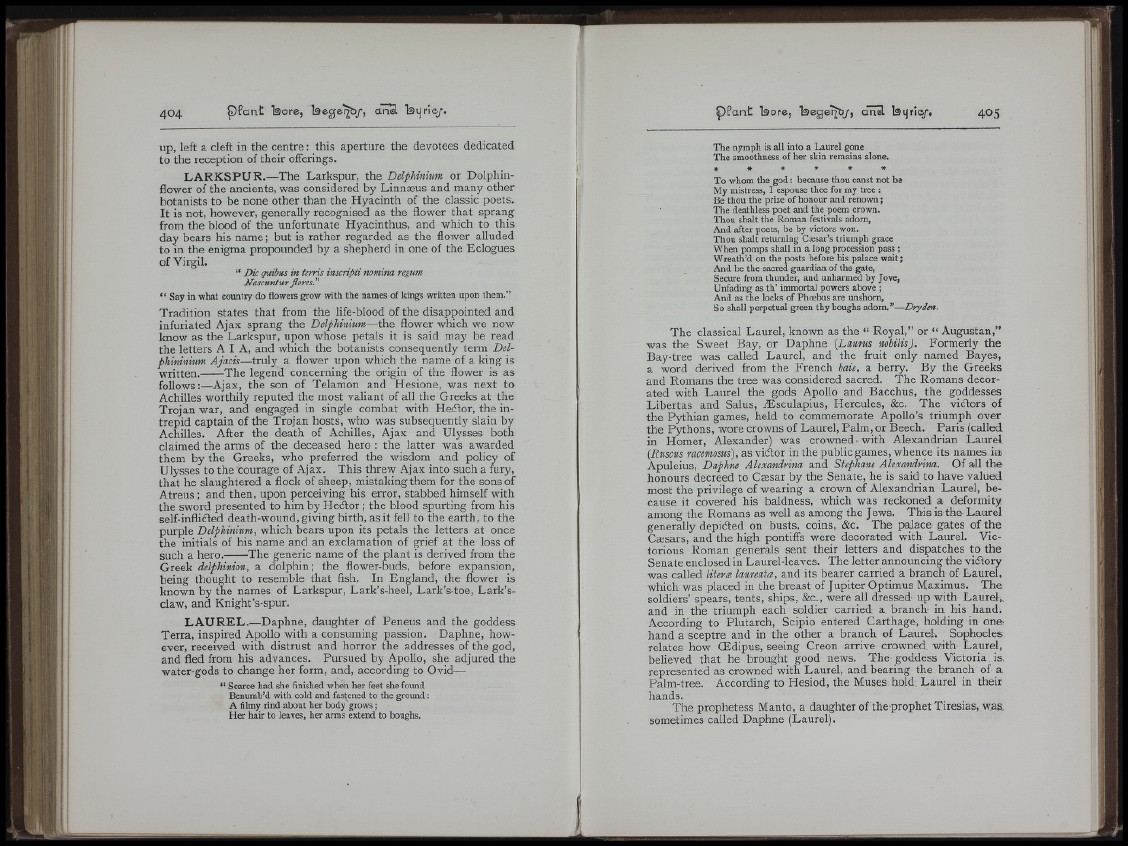
u: ; • I<
} '
h
f
t; ij
•s i
;
. J I
i'i.i
up, left a cleft in the centre: this aperture the devotees dedicated
to the reception of their offerings.
L A R K S P U R .—The Larkspur, the Delphinium or Dolphin-
flower of the ancients, was considered by Linnseus and many other
botanists to be none other than the Hyacinth of the classic poets.
It is not, however, generally recognised as the flower that sprang
from the blood of the unfortunate Hyacinthus, and which to this
day bears his name; but is rather regarded as the flower alluded
to in the enigma propounded by a shepherd in one of the Eclogues
of Virgil.
“ Die qtdbus in terris inscripti noniina regmn
Nasctmtur fio res!
“ Say in what country do flowers grow with the names of kings written upon them.”
Tradition states that from the life-blood of the disappointed and
infuriated Ajax sprang the Delphinium—the flower which we now
know as the Larkspur, upon whose petals it is said maj' be read
the letters A I A, and which the botanists consequently term Del-
phininium Ajacis—truly a flower upon which the name of a king is
written. The legend concerning the origin of the flower is as
follows:—Ajax, the son of Telamon and Hesione, was next to
Achilles worthily reputed the most valiant of all the Greeks at the
Trojan war, and engaged in single combat with Hecflor, the intrepid
captain of the Trojan hosts, who was subsequently slain by
Achilles. After the death of Achilles, Ajax and Ulysses both
claimed the arms of the deceased hero : the latter was awarded
them by the Greeks, who preferred the wisdom and policy of
Ulysses to the courage of Ajax. This threw Ajax into such a fury,
that he slaughtered a flock of sheep, mistaking them for the sons of
Atreus; and then, upon perceiving his error, stabbed himself with
the sword presented to him by Hecilor ; the blood spurting from his
self-infli(5Ied death-wound, giving birth, as it fell to the earth, to the
purple Delphinium, which bears upon its petals the letters at once
the initials of his name and an exclamation of grief at the loss of
such a hero. The generic name of the plant is derived from the
Greek delphinion, a dolphin; the flower-buds, before expansion,
being thought to resemble that fish. In England, the flower is
known by the names of Larkspur, L a rk ’s-heel, L a rk ’s-toe, L a rk ’s-
claw, and Knight’s-spur.
L A U R E L .—Daphne, daughter of Peneus and the goddess
Terra, inspired Apollo with a consuming passion. Daphne, however,
received with distrust and horror the addresses of the god,
and fled from his advances. Pursued by Apollo, she adjured the
water-gods to change her form, and, according to Ovid—
“ Scarce had she finished when her feet she found
Benumb’d with cold and fastened to the ground:
A filmy rind about her body grows;
Her hair to leaves, her arms extend to boughs.
The nymph is all into a Laurel gone
The smoothness of her skin remains alone.
* * * * * *
To whom the god: because thou canst not be
My mistress, I espouse thee for my tree :
Be thou the prize of honour and renown;
The deathless poet and the poem crown.
Thou shalt the Roman festivals adorn,
And after poets, be by victors won.
Thou shalt returning Caesar’s triumph grace
When pomps shall in a long procession pass ;
Wreath’d on the posts before his palace wait;
And be the sacred guardian of the gate,
Secure from thunder, and unharmed by Jove,
Unfading as th’ immortal powers above ;
And as the locks of Phoebus are unshorn,
So shall perpetual green thy boughs adorn.”—Dryden^
The classical Laurel, known as the “ Royal,” or “ Augustan,”
was the Sweet Bay, or Daphne [Laurus nobilis). Formerly the
Bay-tree was called Laurel, and the fruit only named Bayes,
a word derived from the French baie, a berry. B y the Greeks
and Romans the tree was considered sacred. The Romans decorated
with Laurel the gods Apollo and Bacchus, the goddesses
Libertas and Salus, oEsculapius, Hercules, &c. The vidtors of
the Pythian games, held to commemorate Apollo’s triumph over
the Pythons, wore crowns of Laurel, Palm, or Beech. Paris (called
in Homer, Alexander) was crowned with Alexandrian Laurel
[Ruscus racemosus), as vidtor in the public games, whence its names, ins
Apuleius, Daphne Alexandrina and Stephane Alexandrina. Of aff the
honours decreed to Caesar by the Senate, he is said to have valued
most the privilege of wearing a crown of Alexandrian Laurel, because
it covered his baldness, which was reckoned a deformity
among the Romans as well as among the Jews. This, is the- Laurel
generally depidted on busts, coins, &c. The palace gates of the
Caesars, and the high pontiffs were decorated with Laurel. Victorious
Roman generals sent their letters and dispatches to the
Senate enclosed in Laurel-leaves. The letter announcing the vidtory
was called litere laureate, and its bearer carried a branch of Laurel,
which was placed in the breast of Jupiter Optimus Maximus. The,
soldiers’ spears, tents, ships, &c., were all dressed up with_Laurel>,
and in the triumph each soldier carried a. branch in bis hand.
According to Plutarch, Scipio entered Carthage, holding in on©;
hand a sceptre and in the other a branch of Laureb _ Sophocles
relates how (Edipus, seeing Creon arrive crowned, with Laurel,
believed that he brought good news. The goddess Victoria is.
represented as crowned with Laurel, and bearing the branch of a.
Palm-tree. According to Hesiod, the Muses hold Laurel in their
hands.
The prophetess Manto, a daughter of the prophet Tiresias, w,as,
sometimes called Daphne (Laurel).
i'i H